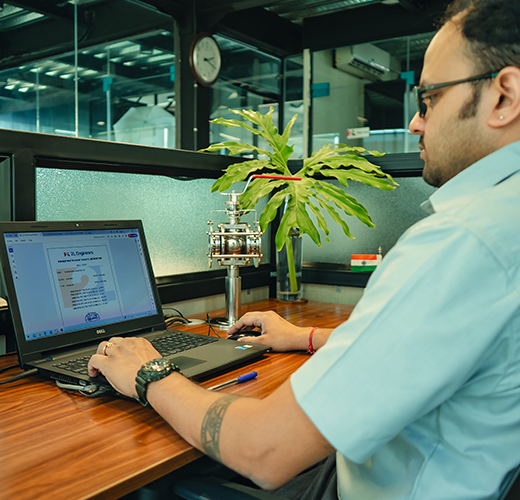In-House Facilities
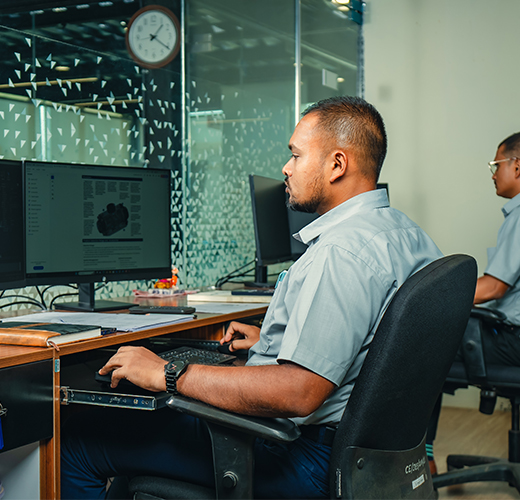
Design & Development
At 2L Engineers, we work closely with our clients to understand the specific applications and intended use of their products, striving to provide the best solutions. All our products are developed and manufactured in accordance with industry standards such as ISO, ASME, API, ASTM, BS EN, and NACE, ensuring the highest quality and reliability. All the designs file are built using the advanced technology available and tools such as Solid Works, Auto CAD and BricsCAD system programs to ensure proper and effective long-term performance of our products in use.
Inward QC
We monitor, control, and ensure that our manufactured products adhere to a strict set of quality criteria, meeting both customer requirements and international standards such as ASTM, NACE and Others. This rigorous quality assurance process applies to all incoming materials, including castings, forgings, and elastomers. Each material undergoes 100% Positive Material Identification (PMI) during the inward inspection process, and we provide 100% Material Test Certificates (MTCs) for all types of construction materials.
Additionally, we perform any special tests required by industry standards or based on specific project or customer needs, ensuring that our products consistently meet the highest quality standards.
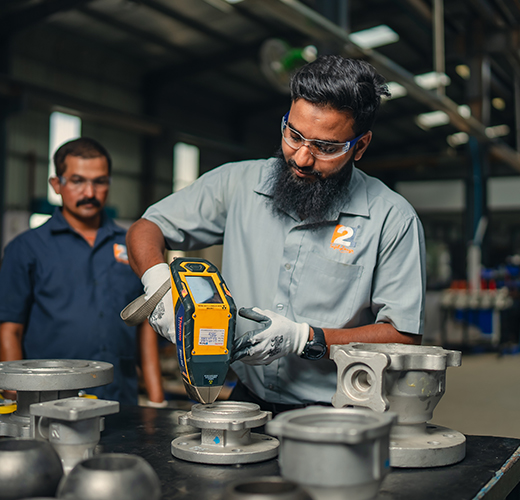
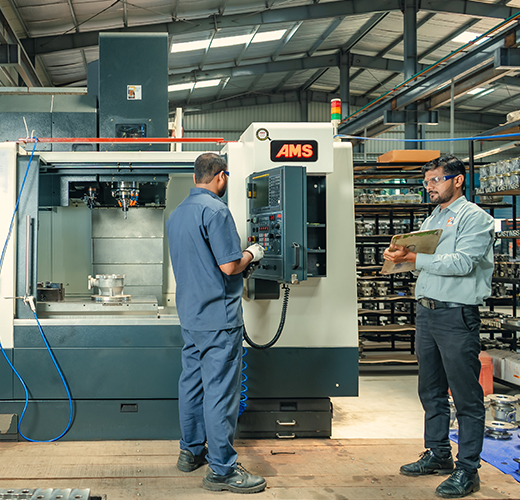
Machining
Our exceptional precision in machining, high degree of automation, flexibility, and ability to handle complex components from a single source distinguish us from our competitors. Our advanced machining capabilities allow us to process a wide range of materials, including both standard and exotic types. These materials range from Carbon Steel and Stainless Steel to Duplex Steel Grades and Alloy Steels. This versatility enables us to meet diverse customer requirements and deliver high-quality, customized solutions.
In-process QC
During the manufacturing process, every component undergoes 100% visual and dimensional inspection to ensure compliance with the drawings, Inspection Testing Plan (ITP), and meet the requirements of the international standards. Only Calibrated instruments are used for all type of measurements. We maintain complete traceability for all components as per the Bills of Material (BOM), ensuring precision manufacturing of our valves.
Additionally, for effective after-sales service, the traceability history of all manufactured components, including their heat numbers, can be established to address and resolve any site-related issues faced by the customer.
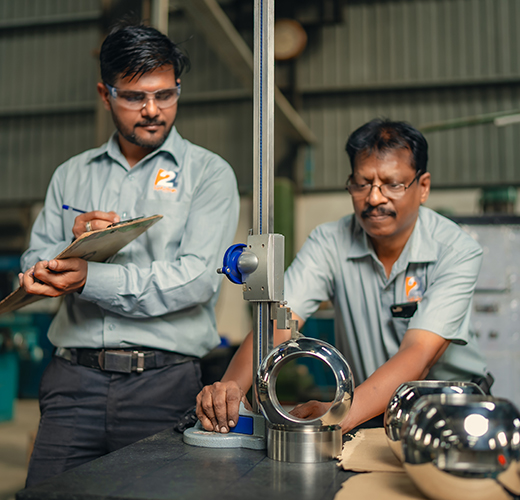
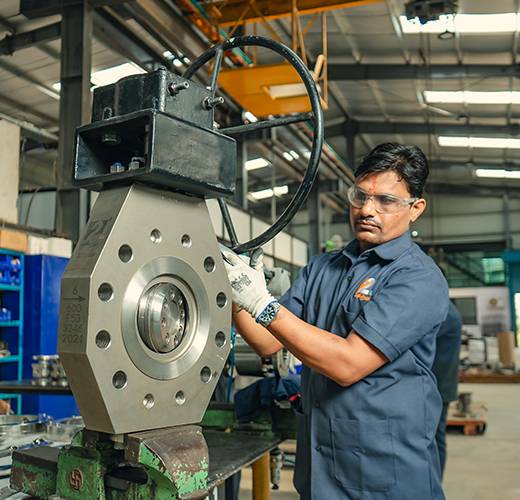
Assembly
Assembly is a crucial and integral part of our entire manufacturing process. Before valve components are assembled, a quality supervisor conducts a thorough pre-assembly check, including visual inspection and dimensional verification of the machined components. This ensures that only components meeting our stringent quality criteria proceed to assembly.
Our skilled workers and supervisors adhere to strict, approved procedures to deliver impeccably assembled products. Every assembled valve is verified against the Standard General Assembly Drawing (GAD) or the Customer’s Approved GAD to ensure dimensional accuracy and correct orientation as specified in the drawings. This meticulous approach guarantees that our valves meet the highest standards of quality and performance.
Final QA/QC
All tests are conducted under controlled conditions, ensuring perfect safety and compliance with industry standards. During valve testing, the supervising engineer verifies that each valve meets the requirements of international testing standards such as API 6D, API 598, EN 12266-1, and others. Each valve undergoes 100% testing, meticulously verified according to the approved Drawings and Inspection Testing Plan (ITP). Our skilled workers and supervisors follow stringent, approved testing procedures to ensure the accuracy and reliability of the tests, maintaining the highest safety standards throughout the process.
This rigorous testing protocol guarantees that all valves meet the required specifications and deliver exceptional performance and durability. As a standard, Pneumatic Testing and Hydro Testing are performed. Other High Pressure Gas Testing, Fire-safe Testing, Cryogenic Testing, Fugitive Emission Testing and Vacuum Testing as performed based on requirements of the clients as per the applicable industry standard.
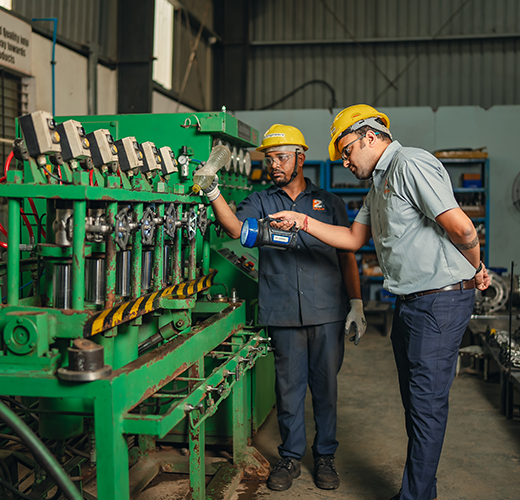
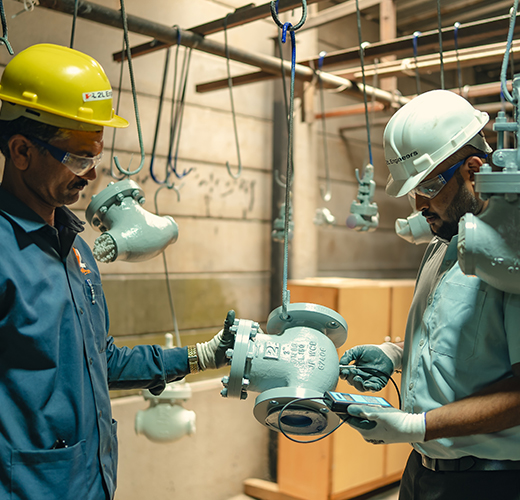
Shot Blasting & Painting
At 2L, we recognize that a well-manufactured valve is not complete until it is meticulously coated and prepared for site delivery. To achieve this, we perform a Shot Blasting process to prepare or clean the surface by propelling a stream of abrasive material at it. Once the surface is prepared, we apply single-coat or multi-coat epoxy and polyurethane systems, following our standard procedures or meeting specific customer requirements.
We conduct various tests to ensure the quality of the coating, including Dry Film Thickness (DFT) measurement, Holiday Testing, Salt Contamination testing, and any other tests required by the customer. This comprehensive approach guarantees that our valves not only meet the highest manufacturing standards but also exhibit superior surface protection and appearance.
Marking & Packaging
At the final stage, once the product is ready, all valves are marked in accordance with standard requirements. Depending on the customer's specifications, each valve is either laser engraved or fitted with stainless-steel nameplates, braided SS wire and rivets.
For every consignment, we provide a detailed packing list along with complete tracking details to ensure smooth and efficient delivery. Special care is taken for all export consignments to meet project requirements and ensure ease of delivery at the site. This meticulous attention to detail in marking, packaging, and logistics ensures that our products arrive safely and ready for immediate use.
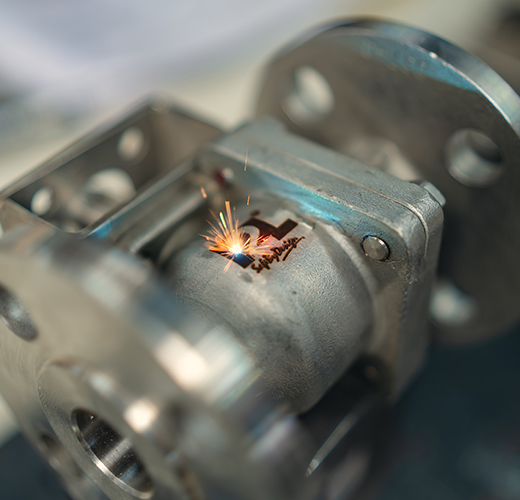
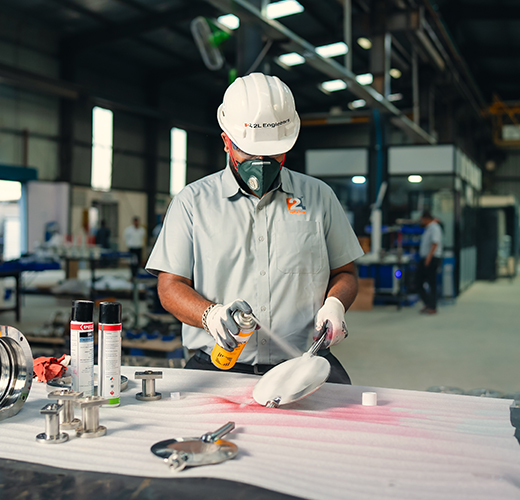
Non-Destructive Testing (NDT)
There are various detection methods for valves, including mechanical performance testing, chemical composition analysis, and non-destructive testing (NDT). Non-destructive testing is a method that evaluates materials without causing any damage. Changes in the internal structure of a material result in physical changes, which can be detected using NDT principles. Common NDT techniques include radiation (RT), ultrasound (UT), penetration (PT), and magnetic particle (MT) testing.
At 2L Engineers, our NDT-qualified Level II engineers perform these tests using approved NDT procedures developed by certified ASNT SNT Level III personnel. This ensures that our non-destructive tests are accurate and reliable, maintaining the highest standards of quality and safety.
Welding
Welding plays a decisive role in the production of our valves, as for valves a very important function is the protection of surfaces against wear and corrosion by surfacing the protective layers. As a standard procedure, a Welding Procedure Specification (WPS) is created by a welding engineer or other trained welding supervisor, and it is designed to meet specific piping construction codes or other standards. For the WPS to become meaningful and valid, it is qualified and this is done through a process called the “procedure qualification record” (PQR), which verifies that the WPS actually works as it should. After the procedure is written and qualified, the individual welder will perform a weld to prove that they can make a quality weld in accordance with that procedure. This third part of the welding procedure documentation trail is called the “welder performance qualification” (WPQ).
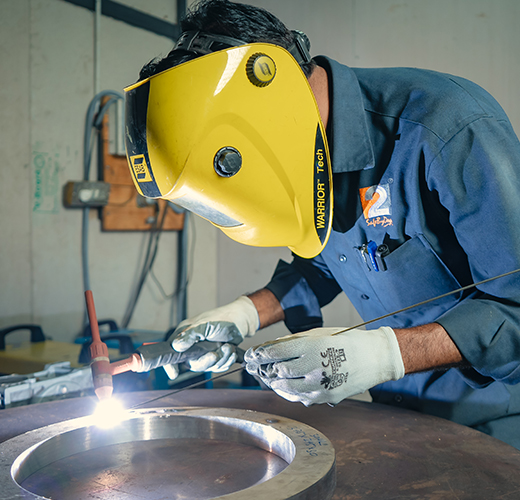
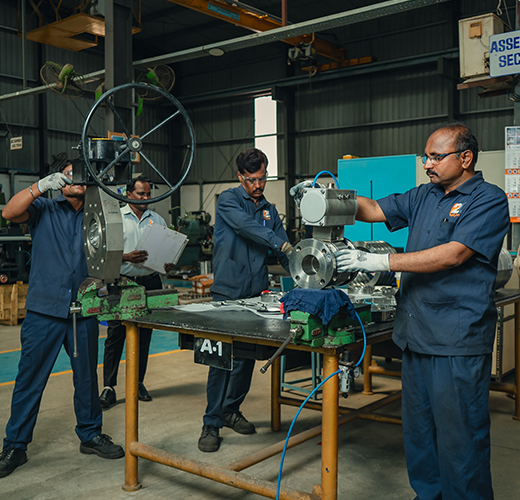
Valve Automation
Automated valves, which operate without manual effort, play a significant role in various applications. These valves can be actuated using pneumatic, hydraulic, electric, or a combination of these methods. At 2L Engineers, we offer valves tailored to client requirements, including manual operations (lever and handwheel), gear-operated, bare shaft, or fully automated solutions. Depending on client needs, we integrate manual valves with automation systems.
Automated valves undergo rigorous cyclic testing, typically 50-100 cycles depending on valve size, to ensure optimal functionality before final testing. We prioritize careful packaging to ensure the safe delivery of automated valves to their intended site.
Documentation
Documentation is a critical aspect of project execution, serving as a comprehensive record of the entire manufacturing process. Each project comes with unique documentation requirements based on datasheets, applicable standards, Inspection Testing Plans (ITPs), and project specifications. At 2L Engineers, we possess extensive experience in managing diverse documentation requirements mandated by major EPCs in India and overseas, as well as OEM customers. We adhere to stringent standards to ensure all documentation is meticulously compiled and maintained.
After the weld is made, specific mechanical and or chemical tests are performed on the test sample to verify that the welder performed the procedure correctly, and the weld was sound. This comprehensive documentation and testing process ensures that our welding procedures meet stringent standards and produce reliable, durable welds.
